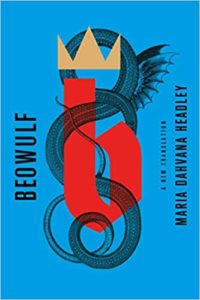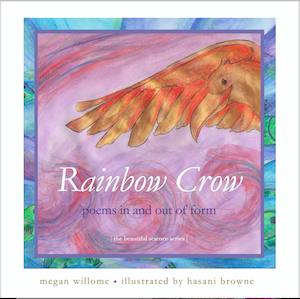Not Lost in Translation
Translation is a difficult dance. It’s the epitome of doing everything a person writing in their native tongue does, but backward, in high heels. That’s why I enjoyed Maria Dahvana Headley’s contemporary rendering of the ancient tale of Beowulf.
I love a good translator’s note, and I’ve read Headley’s three times. Here is the perspective this particular woman brings to this manly tale:
This translation, for example, was completed during the first months of my son’s life. Parenting a baby is listening to someone use a language in which certain sounds mean a slew of things, and one must rely heavily on context to gain clarity; a language in which there is no way to translate accurately the ancient sound which means ‘hungry,’ because, to the preverbal speaker, the sound means and is used to signal a compendium of things, something more like ‘belly hurt—longing—breast—empty mouth—bottle—swallow—milk—help.’”
I’m not saying a man couldn’t write this explanation of the complexities of translation, but few would think to make the comparison to breastfeeding. So, imagine one translation uses the word “hungry,” another “belly hurt,” another “milk—help,” and all are both accurate and, simultaneously, incomplete. It’s a tricky dance, and those heels are awfully high.
Headley’s translation begins with a polarizing word — “Bro” — which is not so far from the “So” that introduces poet Seamus Heaney’s esteemed translation. She imagines the narrator as a guy at the end of the bar, telling a whopper of a tale. He uses modern slang and modern profanity. He repeats himself and goes off on tangents. I’ve known a version of That Guy all my life, so this style of narration suited me just fine.
Since reading Heaney’s now-21-year-old translation I have read more old works of literature — including The Odyssey (translated by a woman) and Don Quixote (also translated by a woman) — and Beowulf makes more sense to me now. This time I pictured a Beowulf who is a cross between the Scandanavian hero/bad boy Erlend Nikulausson (in a story by a woman, translated by a woman) and actor Michael B. Jordan in his Black Panther role.
In this 1,000-year-old story set in ye ol’ Denmark and Sweden, Beowulf fights three foes: Grendel, Grendel’s mother, and a dragon. He defeats all three but dies in the third battle, which takes place when he is old, after having been a king for fifty years. He is a hero, he is a good king, and he is all man. And yet Grendel’s mother has captured the imaginations of listeners and readers and translators for centuries.
Headley encountered Grendel’s mother in a childhood book of monsters and thought this fierce warrior was the main event. Her translator’s note goes into detail about how the words from the extinct language in which Beowulf was written have yielded very male-centric translations.
The Old English word for fingers, fingrum, has frequently been translated as ‘claws,’ but Grendel’s mother fights effectively with a knife, and wielding a knife while also possessing long nails is — as anyone who’s ever had a manicure knows — a near impossibility.”
Truer words were never spoken.
Yet somehow this paragraph combined with Headley’s translation of Beowulf’s encounter with a vengeful mother on a mission makes me picture a woman whose ultra-high-end manicure has supernaturally transformed her fabulous nails into claws, and yet she is so powerful she can still wield a knife with deadly ferocity. (Hey, a girl can dream.)
Despite a translation that does feel as contemporary as a recording surreptitiously captured from a bar stool, it’s still quite poetic. Headley has a lot of fun with alliteration, such as this description of how Grendel will die, not quickly “but sickly, slow, suffering, his sinning spirit sent to sink slowly down to Hell,” by the hand of Beowulf “rendering him a revenant in the hall he’d always reveled in.”
This is not the last translation of Beowulf, and it shouldn’t be. There will be other perspectives to address as the sun goes ‘round the bend, year after year, century after century.
Because, ultimately, this is a merry yarn about a roving gypsy who went down to the seas, managed a few long tricks with a blade, then ended with quiet sleep and sweet dreams. It’s an epic poem, describing a man of honor and his toil who did some work of noble note. And it’s a horror flick, in which a king’s defeat causes a woman to weep, knowing the realm is now vulnerable to worse monsters than, well, monsters.
Headley ends her translation not with Beowulf’s manly triumphs but with his humanity:
He was the man!
He was the man.
Bro. Sis. Put on your dancing shoes and tell us the story again.
Your Turn
1. What is a book you have read in translation?
2. Where do you stand on the issue of profanity in a book?
3. Share your September pages. Sliced, started, and abandoned are all fair game.
September’s Pages
Poetry
Songs for the Open Road: Poems of Travel and Adventure, by The American Poetry & Literacy Project
Sky Words, by Marilyn Singer, illus. Deborah Kogan Ray (children’s poetry)
Picture Books and Early Readers
Vitamina T for Tacos, by Mando Rayo and Suzanne García-Mateus, illus. Martha Samaniego Calderón (Join us for Children’s Book Club, Friday, October 14!)
The People’s Painter: How Ben Shahn Fought for Justice with Art, by Cynthia Levinson, illus. Evan Turk
Arctic Lights, Arctic Nights, by Debbie S. Miller, illus. Jon Van Zyle
Mommy’s Khimar, by Jamilah Thompkins-Bigelow, illus. Ebony Glenn
Middle Grade and YA
The Tough Guide to Fantasyland, by Diana Wynne Jones (for any age group who might love a parody of a travel guide)
The Nightmare Brigade, vol. 1 The Girl from Déjà Vu, by Franck Thilliez, Yomgui Dumond, and Drac
Grownups
Beowulf, by someone long ago and far away, translated Maria Dahvana Headley
Tomorrow and Tomorrow and Tomorrow, by Gabrielle Zevin
Still reading
Giant, by Edna Ferber
Photo by Max and Dee Bern, Creative Commons, via Flickr. Post by Megan Willome.
Browse more book reviews with Perspective
“Megan Willome has captured the essence of crow in this delightful children’s collection. Not only do the poems introduce the reader to the unusual habits and nature of this bird, but also different forms of poetry as well.”
—Michelle Ortega, poet and children’s speech pathologist
- Perspective: The Two, The Only: Calvin and Hobbes - December 16, 2022
- Children’s Book Club: A Very Haunted Christmas - December 9, 2022
- By Heart: ‘The night is darkening round me’ by Emily Brontë - December 2, 2022



Glynn says
I just finished reading “The Backstreets” by Perhat Tersun, a Uygher writer who has very few works translated. The manuscript was finished in 2015 but never published in Uygher, much less any other language. In 2018, he was arrested by the Chinese government and supposedly sentenced to 16 years in prison for some unspecified crime. No one knows where he is, or if he’s still alive.
I’ve also ready most of Eugene Vodolazkin’s works, translated from the Russian, including his most recent one, “Brisbane.” He’s a native Ukrainian who lives in St. Petersburg. His “Laurus” and “The Aviator” are wonderful, and “Brisbane” has a twist of an ending that leaves you a bit stunned.
September reading
Non-fiction
The Rise and Triumph of the Modern Self by Carl Trueman
The Myth of Voter Suppression by Fred Lucas
Ends of War: The Unfinished Fight of Lee’s Army After Appomattox by Caroline Vanney
Making Peace with Paradise by Tania Runyan
Eyewitness to the Civil War by Stephen Hyslop
The Civil War in Mississippi: Major Campaigns and Battles by Michael Ballard
Mystery
Behind Closed Doors by JJ Marsh
Murder of the Bride by Faith Martin
Death at Whitewater Church by Andrea Carter
Murder in the Barn by Roy Lewis
Fiction
Starting Over in Silverleaf Falls by Christina Butrum
Christmas in Venice by Meadow Taylor
Midnight in Venice by Meadow Taylor
The Backstreets by Perhat Tersun
Poetry
The Illustrated Emily Dickinson by Ryan Van Cleave
Megan Willome says
Glynn, I owe you a h/t for this post, because Headley’s translation was mentioned in one of your Saturday Good Reads. So, thanks!
I am grateful you are reading the Uygher writer.
I will probably read Vodolazkin again, but not this year. I’d love to discuss “Laurus” with someone, even though I can’t say I actually liked it. I’ve heard good things about “Brisbane.”
L.L. Barkat says
Oh, that description of translation is SO good. Sara and I did some translation for Tania’s How to Write a Form Poem and I’d say that’s sort of how we approached it—the fullness of words, inexpressible.
In fact, for one haiku that seemed like it couldn’t possibly be translated yet another way, we found some backstory on one of the words that we felt had never been brought forward (the word meant sort of “you annoying disgruntle-making [expletive] old crow how dare you”] 🙂 ) Oh, Basho. 🙂
Thanks for this fun discussion of a new (old) Beowulf!
Megan Willome says
Languages are such rich things, so alive and nuanced. I’m happy you dug into get to the heart of Bashō for that haiku.